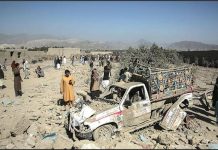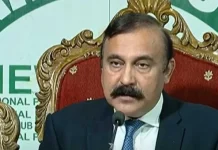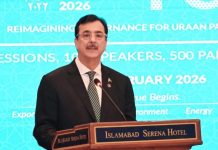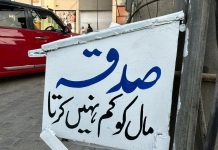
Dr. Syed Mehboob
Political and Economic Analyst
http//: www.thenewslark.com
drmehboob.thenewslark@gmail.com
Islam is a universal religion that believes in brotherhood, unity, and humanity. There are about 1.9 billion Muslims in the world which is 24.75 percent of the world population. Every fourth person in the world is Muslim. The Muslim community is an important part of the world. Every year, Muslims celebrate Ramadan with religious zeal. With a difference of one or two days, Muslims worldwide celebrate Ramadhan. The core of Ramadhan is fasting, abstaining from food and drink from dawn to sunset. Muslims often pray more during Ramadhan, including the optional Tarawih prayers at night. It is estimated that the whole Quran is recited about one billion times in the world, which is more than any other book in the world is read in the whole year. There are millions of Hufaz, those who memorized the whole Quran, and a great majority of them recite the whole Quran in Prayer, and in the great majority of Mosques, in Tarawih whole Quran is recited in twenty to thirty days. In some of the Mosques, Tarawih is accompanied by the recitation of the Quran with translation and short commentary. Muslims are encouraged and increase give charity, helping needy people both through obligatory charity (Zakat) and voluntary donations, which are called Sadakat. Muslims eat a pre-dawn meal and fasting begins, and refrain for the whole day from eating and drinking every kind of meal and liquid. They break their fast after sunset. They get immense spiritual power during the whole of Ramadhan. Ramadhan is also a time for families and communities to come together for meals and gatherings. Muslims also believe that there is a night in Ramadhan which is better than a thousand nights and it is called “Lailatul Qadr.” They seek this night on odd nights means 21,23,25,27, and 29th of Ramadhan, and often they spend a major part of these nights in praying. The Holy Quran is revealed in Lailatul Qadr. After a whole month of fasting Muslims all over the world in gratitude for Ramadhan celebrate Eid al-Fitr, which is a very special festival.
Islam is the religion of peace, tolerance, and humanity, and the Prophet Muhammad (Peace be upon him) was sent as a blessing to all mankind, according to Michael H. Hart. Muhammad (Peace be upon him) was the most influential personality in the world since history has been recorded. There are 57 Muslim countries in the world. Approximately 12% of Muslims live in Indonesia, the largest Muslim populous country in the world, 31% live in South Asia, 21% live in the Middle East- North Africa, and 15% live in Sub-Saharan Africa. Sizeable Muslim communities are present in the Americas, China, Europe, and other parts of the world. Islam is the world’s fastest-growing major religious group and is projected to be the world’s largest religion by the end of the 21st century.
Indonesia is the largest Muslim country where about 12% of Muslims of the world live. It is a country in Southeast Asia and Oceania, between the Indian and Pacific oceans, comprising over 17,000 islands, including Sumatra, Java, Sulawesi, and parts of Borneo and New Guinea. It is the world’s largest archipelagic and the 14th largest country by area at 1,904,569 square kilometers. With over 280 million people, it is the world’s fourth most populous country and the most populous Muslim country. Java is the world’s most populous island, home to more than half of the country’s population.
Religions in Indonesia
| Religion | % of Total population |
| Islam | 87.1 |
| Christianity | 10.4 |
| Hinduism | 1.7 |
| Buddhist | 0.8 |
Ramadhan, the ninth month of the Islamic calendar, is considered the holiest month for Muslims around the world. It is also much awaited in the world’s most populous Muslim majority country, Indonesia. Around 87 percent of Indonesia’s population celebrates Ramadhan with great zeal and traditional fervor. For most observant Muslims, this is the month of spiritual reflection, prayer, charity, and other good and virtuous deeds. After a month of fasting, Muslims celebrate Eid al-Fitr festival on the first three days of Shawwal, the tenth month in the Islamic calendar.
Ramadhan falls on a different date every year, typically eleven days earlier than the previous year. Muslims in Indonesia mark the start of the Holy month of Ramadhan in various ways, such as visiting the graves of ancestors to pay respects and communal feasts. This largely depends on the region they live in and the cultural heritage that belongs to it. The practice of Bukber, which stands for Buka Bersama or breaking of the fast together with friends and family outside of home, is also one of the most anticipated Ramadhan traditions among Muslims in Indonesia. It is one of the most anticipated Ramadhan traditions among Muslims in Indonesia. It is also one of the most popular outdoor activities during Ramadhan after religious activities in mosques. Almost every Muslim in Indonesia considers Ramadhan as an opportunity to spend time with their family. For those living far away from their relatives, travelling to their hometowns and villages towards the end of Ramadhan to celebrate Eid ul Fitr is an important part of their Ramadhan traditions. A recent survey showed that about half of Muslims in Indonesia plan to travel during Ramadhan and Eid ul Fitr, and some online travel agencies usually become the most preferred booking method for travel tickets during this period. All employees in the country receive a 13th-month bonus, commonly referred to as Tunjangan Hari Raya (THR) during Ramadhan, increasing their disposable income and providing financial relief. Around half of Indonesian consumers use their Tunjangan Hari Raya ( THR) allowance for shopping. Torchlight parades are held on the streets of Indonesia. They perform Tarhib Ramadhan, a traditional event to welcome the Holy month of Ramadhan in Indonesia. Islamic rituals are performed with the combination of the cultural heritage of the archipelago, which makes Ramadhan celebrations in Indonesia unique and captivating.
In Indonesia, unlike most countries, anticipation for Ramadhan begins weeks in advance. In villages and suburban areas, communities engage in massive preparations for Ramadhan, not only in their own home but also in the neighborhood. This includes cleaning houses and mosques, decorating their own homes, but also in the neighborhood. This includes cleaning houses and mosques, decorating their homes with colorful lights and banners. Traditional markets are busting with Ramadhan preparation activities. People are busy shopping for food items and other necessities. A week or so before Ramadhan, public cemeteries are filled with people paying respects to the departed. As Ramadhan approaches, cemeteries are usually filled with pilgrims. Ramadhan in Indonesia is also closely associated with togetherness and community relations. Communal culture is manifested through activities such as breaking the fast(Iftar ) together, often referred to as “ Bukber” ( Buka Bersama). These Buker gatherings are commonly held among friends, families, residential communities, and also in public in mosques. Buker gatherings often serve as a reunion for those who haven’t met in a long time. Buker during Ramadhan has become a highly anticipated special moment, and people usually make time to attend these Buker events. It is not just about breaking the fast and eating together; the desire to foster closer relationships is the primary reason for attending Buker gatherings.
Another special aspect of the Buker gathering is the act of sharing. It’s common in Indonesia to organize Buka Bersama events with the less fortunate. These Buker gatherings are often held in orphanages, nursing homes, shelters, and mosques. Along with breaking the fast with the less fortunate, these events often involve donation activities.
In mosques, such as the Istiqal Mosque in Jakarta, Buker events are opened to the public. The mosques provide free food, like takjil ( Appetizer for Iftar) and Nasi Bungkus or Nasi Kotak ( packed meals or rice box) to be shared during Iftar. Everyone, from those intending to pray Maghrib at the mosque, passing travelers, to the needy, all come together to break their fast in the spirit of togetherness during Ramadhan.
Indonesia is also famous for its mouthwatering Indonesian cuisine. As Iftar approaches, street vendors and restaurants offer a wide variety of Indonesian dishes, including Koak ( sweet boiled fruits made with dark palm sugar, coconut, milk, and Pandan Leaves), Burbur Sumsum ( rice flour in coconut milk, and served with sugar syrup), fried snacks, and Jajan Pasar( traditional market snacks).
Each region in Indonesia has its own special Ramadan dishes, adding to the country’s culinary diversity. As Eid al-Fitr approaches, traditional dishes specific to the holiday start to appear, such as ketupat (rice cakes in woven palm leaves), chicken Opor (coconut milk-based chicken stew), sambal goreng Ati (spicy liver dish), pumpkin soup, and rendang (spicy beef stew). Eid celebrations in Indonesia are incomplete without these foods!
Throughout Ramadan, Pasar Kaget (a temporary market that occurs when there is a crowd or celebration), night markets, and bazaars spring up in various cities across Indonesia. Pasar Kaget are usually held in the afternoon in front of mosques, fields, and town squares, while night markets appear after sunset. Ramadan bazaars are often found in malls. Various foods, clothes, and items for Ramadan and Eid preparations are available and can be bought at discounted prices, if you’re lucky.In addition to food stalls, these markets and bazaars sometimes feature live music, ranging from modern music to Qasidah (traditional Islamic chants) and Marawis (a group playing a small double-sided, high-pitched hand drum originally from the Middle East), as well as cultural performances typical of each region. Various Islamic-themed competitions are also often held, such as an Azan recitation competition, Qasidah singing competition, and Quran recitation festival. All of these contribute to making the Ramadan celebration atmosphere more vibrant and meaningful!
Despite the festive atmosphere of Ramadan celebrations, Indonesians also emphasize spiritual reflection. Muslims in Indonesia allocate additional time for sunnah prayers, Quran recitation, dhikr, and I’tikaf in mosques. Almost every mosque holds communal Tarawih prayers every night. The peaceful atmosphere of mosques during Ramadan provides a place for spiritual contemplation to draw closer to Allah SWT.

























